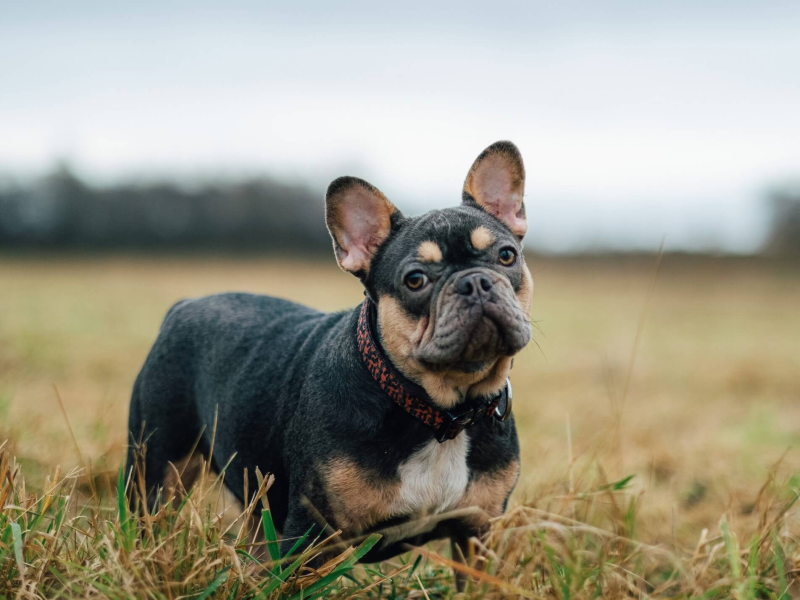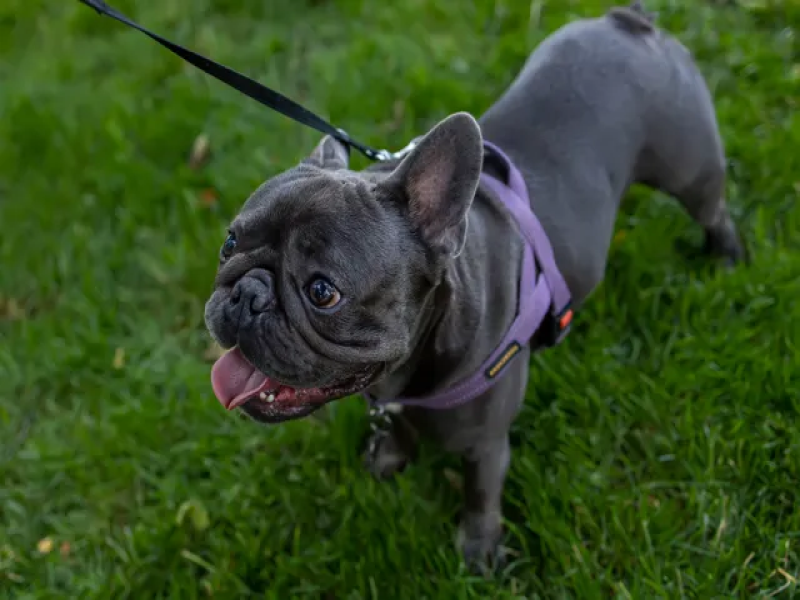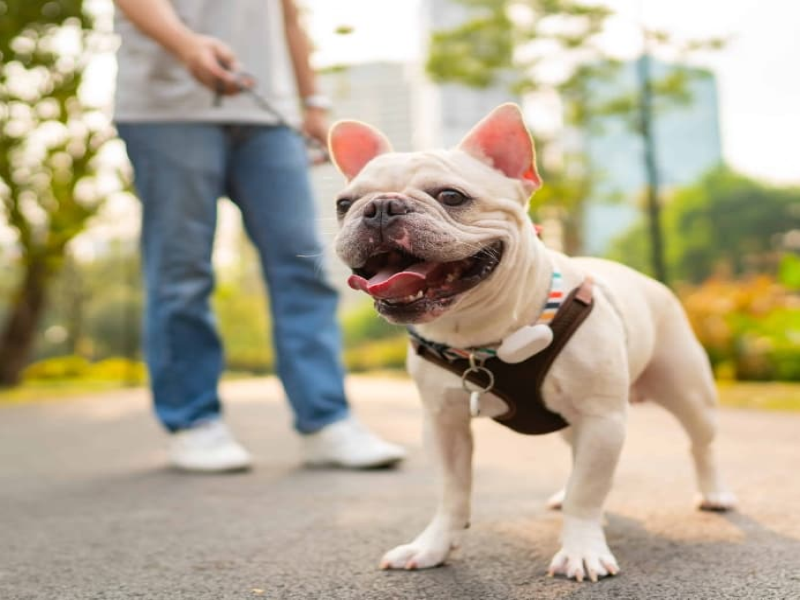As the years go by, it’s important to change how you live with your pet French Bulldogs to meet their changing needs. Senior Frenchies may not have as much energy as they did when they were puppies, but they still need to exercise regularly to keep their bodies and minds healthy.
But it’s important for them to focus on low-impact tasks that are easy on their bodies and joints as they age. We’ll talk about the benefits of exercise for older Frenchies, how to know their limits, and a variety of fun low-impact tasks that will keep them busy and happy in this guide.
Remember that every Frenchie is different, and their exercise needs may change based on their age, health, and attitude. You should always talk to your vet before making a workout plan for your furry friend that is safe and fun for them.

Why is Exercise Important for Senior Frenchies?
Regular exercise is still very important for our Frenchies’ health and happiness, even though they age elegantly. Even if the volume and length of the exercise need to be changed, it is still good for older Frenchies in many ways. Let’s talk more about why exercise is so important for their health.
Maintain a Healthy Weight
Senior Frenchies can lose weight, which is one of the best reasons to work out. Dogs’ metabolisms slow down with age, which makes them more likely to add weight. Being overweight can make health problems worse, like joint pain, heart disease, and diabetes. Working out regularly can help you lose weight and keep it off, which lowers your risk of these problems.
Improve Muscle Tone and Strength
Frenchies that are getting older need to exercise to keep their muscles toned and strong. Strong muscles protect their joints, make it easier to move around, and keep them from falling. Walking and swimming are two easy workouts that can make a big difference in their general strength and steadiness.
Boost Mental Health
Exercise isn’t just beneficial for the body; it’s also crucial for mental well-being. Regular physical activity helps reduce boredom, anxiety, and depression in senior Frenchies. It provides mental stimulation, boosts their mood, and helps them stay engaged and happy.
Strengthen the Bond with Their Owner
Doing things together with your older Frenchie makes your friendship stronger and your relationship stronger. Working out together gives you a chance to spend quality time together and make memories that you will both treasure.
Additional Benefits of Exercise
In addition to the above, exercise can also:
- Improve cardiovascular health
- Enhance cognitive function
- Promote better sleep
- Increase lifespan
By prioritizing exercise for your senior Frenchie, you’re not just promoting their physical health but also nurturing their mental and emotional well-being. It’s a gift that keeps on giving, ensuring a happy, healthy, and fulfilling life for your furry companion.
Understanding Your Senior Frenchie’s Limitations
Even though older Frenchies need to exercise, it’s also important to know and respect their limits. As they get older, their bodies change, and things that were easy for them before might now need to be adjusted and changed. If you know about these limits, you can change their workout plan to keep them safe and comfortable.
Common Health Issues in Senior Frenchies
French Bulldogs are prone to certain health issues, which can become more pronounced as they age. These include:
- Arthritis: This degenerative joint disease can cause pain and stiffness, making movement challenging.
- Hip Dysplasia: This condition affects the hip joints, leading to discomfort and mobility issues.
- Breathing Difficulties: French Bulldogs are brachycephalic breeds, meaning they have shortened snouts that can cause breathing difficulties. Strenuous exercise can exacerbate these issues.
Signs of Overexertion
It’s important to monitor your senior Frenchie during exercise and watch for signs of overexertion. These may include:
- Heavy panting: If your Frenchie is panting excessively or struggling to catch their breath, it’s a sign that they need to rest.
- Limping or favoring a leg: This could indicate joint pain or discomfort.
- Reluctance to move: If your Frenchie is hesitant to walk or play, it could be a sign that they are tired or in pain.
Importance of Consulting Your Vet
It’s important to talk to your doctor before starting or changing your senior Frenchie’s training routine. They can look at your dog’s general health, find any underlying conditions, and give you personalized advice on how to train your dog in a safe and healthy way.
Your vet may also suggest vitamins or medicines to help your Frenchie’s joints stay healthy or deal with pain, so they can enjoy their activities without any problems.
Remember that every adult Frenchie is different, and the amount of exercise they need will depend on how healthy and fit they are. You can make an exercise plan just for them that keeps them healthy, happy, and busy in their golden years by paying attention to their cues and talking to your vet.
Top Low-Impact Activities for Senior Frenchies
The key to your Frenchie’s happiness and long life is to find the right mix between keeping them busy and understanding their limits. Here are some great low-impact tasks that will be fun and safe for your older friend or family member:
Walking: A Classic for a Reason
Walking remains the cornerstone of exercise for senior Frenchies. It provides gentle cardiovascular exercise, mental stimulation, and valuable bonding time with their owner.
- Benefits:
- Strengthens muscles and improves joint health
- Boosts cardiovascular fitness
- Enhances mental stimulation through exploring new sights and smells
- Provides an opportunity for bonding and quality time
- Tips:
- Opt for shorter, more frequent walks rather than one long strenuous walk.
- Avoid hot pavement as it can burn their paws. Walk early in the morning or late in the evening when the ground is cooler.
- Consider using a harness instead of a collar to avoid putting pressure on their neck and spine.
- Adjust the pace to your Frenchie’s comfort level. Let them sniff and explore at their leisure.
Swimming: A Splash of Fun
Swimming is a fantastic low-impact exercise that’s gentle on joints while providing a full-body workout. The buoyancy of water reduces stress on their joints, making it an ideal activity for senior Frenchies with arthritis or mobility issues.
- Benefits:
- Improves cardiovascular health and endurance
- Builds muscle strength and tone
- Provides a refreshing and enjoyable experience
- Tips:
- Always supervise your Frenchie closely when they’re in the water.
- Use a life jacket for added safety, especially if they’re not strong swimmers.
- Introduce them to water gradually and make it a positive experience.
- Avoid cold water as it can cause muscle cramps. Opt for lukewarm water instead.
Indoor Games: Fun and Stimulation on Rainy Days
Indoor games are a great way to keep your senior Frenchie entertained and active, even when the weather isn’t cooperating. These games provide mental stimulation and gentle physical activity without putting too much strain on their joints.
- Benefits:
- Improves cognitive function and memory
- Provides mental and physical stimulation
- Strengthens the bond between you and your Frenchie
- Examples:
- Hide-and-seek with treats: Hide treats around the house and let your Frenchie use their nose to find them.
- Gentle tug-of-war: Play a gentle game of tug-of-war with a soft toy, being careful not to pull too hard.
- Puzzle toys: These interactive toys challenge your Frenchie’s mind and keep them entertained for hours.
Gentle Fetch: A Classic with a Twist
Fetch is a classic game that most dogs love, but it’s important to adapt it for senior Frenchies. Focus on gentle throws and short distances to avoid overexertion or injuries.
- Benefits:
- Provides cardiovascular exercise
- Enhances mental engagement
- Easy on their joints
- Tips:
- Use a soft toy that’s easy for your Frenchie to pick up and carry.
- Keep the throws short and avoid encouraging them to jump or twist.
- Take breaks if they seem tired or out of breath.
Stair Climbing: Building Strength and Balance
If you have stairs in your home, climbing them can be a great way to strengthen your senior Frenchie’s legs and improve their balance.
- Benefits:
- Strengthens leg muscles
- Improves balance and coordination
- A good option for indoor exercise
- Tips:
- Start with a few steps and gradually increase the number as your Frenchie gets stronger.
- Supervise them closely to ensure they don’t slip or fall.
- Use treats as motivation and positive reinforcement.
These are just a few ideas to get you started. The key is to choose activities that your senior Frenchie enjoys and can participate in safely. Remember, even small amounts of exercise can make a big difference in their overall health and happiness.

Other Considerations for Keeping Your Senior Frenchie Active
Beyond the specific activities mentioned above, several other factors play a crucial role in maintaining your senior Frenchie’s active and healthy lifestyle.
Diet and Weight Management
The food your Frenchie needs may change as it grows. Talk to your doctor to make sure they’re getting the right amount of food and nutrients to keep them healthy and full of energy. Senior dogs need to watch their weight especially because extra weight can put extra stress on their joints and make health problems worse.
Choose high-quality senior dog food that is made to meet their specific needs, and you might want to change the amount they eat based on how active they are.
Mental Stimulation: Engage their Minds
Frenchies that are getting older need mental exercise just as much as they need physical action. Keeping their thoughts active keeps them from getting bored, anxious, or losing their mental sharpness.
Give them a variety of puzzle toys, train them for short periods of time, and take them on new adventures like going to the dog park or taking a car ride. Mental stimulation can come from even simple things, like looking around a new place or playing hide-and-seek with their favorite toy.
Regular Vet Checkups: Monitor Their Health
Senior Frenchies need to go to the vet for regular checkups. Your vet can check on their general health, see how mobile they are, and see if there are any health problems that might mean they need to change how they exercise. They can also give you advice on what exercises and activities are best for your Frenchie based on its specific needs.
Socialization: Interaction with Other Dogs
Senior Frenchies still need to be socialized, but it’s very important to make sure their relationships with other dogs are safe and good. Stay away from things that could make you stressed or overworked. Play dates with friendly, well-behaved dogs that are supervised can be good for you because they keep you active and stimulate your mind.
Creating a Safe Environment
Make sure that your Frenchie’s home is a safe and comfortable place for him to be. Get rid of any things that could cause them to trip, give them soft bedding to protect their joints, and think about using ramps or stairs to help them get around on furniture or other high surfaces.
These extra things can help your senior Frenchie stay healthy by creating a setting that encourages exercise, mental excitement, and general well-being. Remember that a senior Frenchie that is happy and busy is beautiful to look at, and if you work to keep them healthy and active, they will love you forever.
FAQs: Addressing Common Concerns
As a caring owner, it’s natural to have questions about keeping your senior Frenchie active and healthy. Here are answers to some frequently asked questions:
How much exercise does a senior Frenchie need?
A Frenchie senior dog needs different amounts of exercise based on its age, health, and attitude. As a general rule, though, you should try to do at least 30 minutes of light exercise every day, spread out over a few short rounds.
Factors influencing exercise needs:
- Age: Older Frenchies may require less exercise than younger ones.
- Health condition: If your Frenchie has any health issues, such as arthritis or heart problems, their exercise needs will need to be adjusted accordingly.
- Fitness level: A more active Frenchie might require more exercise than a sedentary one.
- Personality: Some Frenchies are naturally more energetic than others.
Always start slowly and gradually increase the duration and intensity of exercise based on your Frenchie’s response. If they show signs of fatigue or discomfort, stop and let them rest.
What if my Frenchie is resistant to exercise?
Some senior Frenchies may be less enthusiastic about exercise, especially if they’re experiencing pain or discomfort. Here are some tips for motivating a reluctant senior dog:
- Make it fun: Choose activities that your Frenchie enjoys, such as playing with their favorite toy or going for a walk in a new environment.
- Use positive reinforcement: Reward them with treats and praise when they participate in exercise.
- Start slowly: Don’t push them too hard. Begin with short, easy sessions and gradually increase the duration and intensity.
- Consider their preferences: Some Frenchies might prefer indoor games or gentle walks over swimming or fetch.
Can I take my senior Frenchie hiking?
Senior Frenchies can enjoy hiking, but it’s important to pick trails that are easy for them to get to and aren’t too steep. Choose paths that are short, flat, and have good footing. Stay away from steep hills, rough ground, and bad weather. Always have a lot of water with you, and stop often to let your Frenchie drink and rest.
You can ask your doctor or an experienced climbing guide if you’re not sure if a certain trail is safe for your older Frenchie.
Remember that the most important thing is to pay attention to your Frenchie’s cues and change their training routine as needed. It’s time to take a break or do something else if they look tired, in pain, or unwilling to take part.

Conclusion
Keeping your old Frenchie busy is a great way to make sure they stay healthy and happy as they age. You can help them stay busy, involved, and full of life by picking low-impact activities, being aware of their limits, and putting their health first.
Remember that every Frenchie is different, so make sure that their training program fits their wants and tastes. Talk to your vet about it and see how they react. Most importantly, enjoy the time you have together and make memories that will last a lifetime.
By putting your senior Frenchie’s health and happiness first by giving them regular exercise and mental stimulation, you’re not only making their life longer, but also better. Get outside and have some low-impact fun with your pet friend. They’ll love you forever and wag their tails in thanks.

